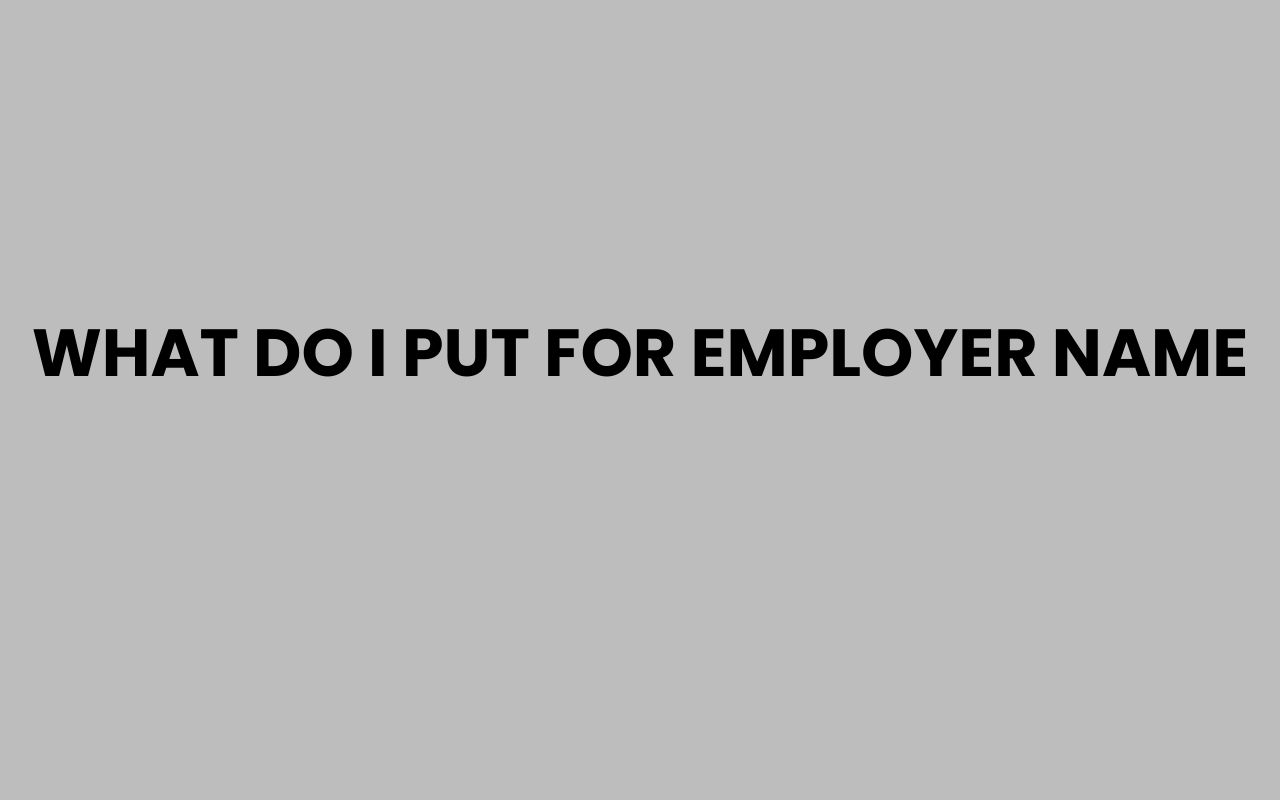Filling out forms often requires you to enter your employer’s name. This seemingly simple task can sometimes be confusing, especially if your work situation is unconventional.
Knowing what to input can ensure your application or form is processed smoothly without unnecessary delays.
If you are employed by a company, this task is straightforward. You simply write down the official name of the company.
However, complications arise when dealing with self-employment, contract work, or multiple employers.
Traditional Employment
For those in traditional employment, the employer name is the official name of the company or organization you work for. This name should match the one on your pay stubs or employment contract.
Consistency is key to avoid any discrepancies.
If you are unsure of the official name, check your employer’s website or any official documentation provided to you. In some cases, a company might operate under different trade names, so it’s crucial to use the legal name.
Self-Employment
Being self-employed introduces unique challenges when asked for an employer name. In this scenario, you have several options depending on your business structure.
If you are a sole proprietor, you can use your own name as the employer name.
For those with a registered business, use the business name as your employer name. This not only adds professionalism but also aligns with any legal or tax-related documentation.
Contract and Freelance Work
Contractors and freelancers often work with multiple clients, making it tricky to decide what to put for employer name. If the form is specific to a certain client, use that client’s name.
For more general forms, you might consider using “Self-employed” or the name of your business if you operate under one.
In some instances, freelancers might be part of platforms that connect them with clients. If you work predominantly through such a platform, consider using the platform’s name.
Multiple Employers
If you have multiple jobs, filling out the employer name section can be daunting. Prioritize the employer most relevant to the form’s purpose.
For instance, if it’s a financial or loan application, use the employer where you earn the majority of your income.
Alternatively, if the form allows, you could list multiple employers. However, ensure clarity by separating each employer name with a comma.
Special Situations
There are numerous unique employment scenarios that can confuse applicants. For example, if you are on a sabbatical, temporarily unemployed, or in between jobs, consider using “Not Applicable” or “N/A” when asked for an employer name.
In cases where you are awaiting a job offer or about to start a new job, you might use the prospective employer’s name, but only if you have a confirmed role.
The Importance of Accuracy
Ensuring the accuracy of the employer name is crucial, especially in legal or official documents. Errors can lead to misunderstandings, processing delays, or even rejection of applications.
Always double-check the spelling and legality of the name you provide. If ever in doubt, consult a supervisor or HR representative for guidance.
Employer Name Examples
| Employment Type | What to Put for Employer Name |
|---|---|
| Traditional Employment | Official Company Name |
| Self-Employed | Your Name or Registered Business Name |
| Freelancer | Client Name or “Self-employed” |
| Multiple Employers | Most Relevant Employer or List with Commas |
| Temporary Unemployment | “N/A” or “Not Applicable” |
Online Forms and Employer Name
Many online forms have specific requirements or limitations on text input. When entering your employer name, be mindful of character limits or required formats.
Some forms may only allow alphabetic characters, so avoid using symbols unless permitted.
Online submissions are often automated, so any deviation from expected formats might lead to errors. Always review each form’s instructions regarding employer information before submission.
Employer Name in Resumes
When listing your employer name on a resume, clarity and consistency are key. Potential employers appreciate seeing accurate representations of your work history.
If you’ve worked under a brand or trade name, consider including it alongside the official company name for context.
“Your resume is your personal marketing tool. Consistency in employer names reflects attention to detail, a quality highly valued by employers.”
Employer Name for Verification Processes
Some processes, such as background checks or employment verifications, heavily rely on the employer name. Providing an incorrect or informal name can hinder these checks, potentially delaying your application or hiring process.
To avoid complications, ensure you have documentation ready, such as pay stubs or employment letters, which can verify the employer name you provided.
Common Mistakes to Avoid
Many people inadvertently make mistakes when entering employer names. One common error is using abbreviations or acronyms instead of the full legal name.
While convenient, this can lead to confusion, especially with less common or ambiguous abbreviations.
Another mistake is omitting important elements of a name, such as “Inc.,” “LLC,” or “Corp.” These elements are part of the legal entity’s name and should be included unless specified otherwise.
Conclusion
Determining what to put for employer name is a crucial task that requires attention to detail and understanding of your work situation. Whether you’re traditionally employed, self-employed, or a freelancer, the correct input ensures smooth processing and reflects professionalism.
Always prioritize the accuracy and legality of the names you provide. If you’re ever unsure, consult available resources or seek advice from relevant authorities to ensure your information remains consistent and correct.

